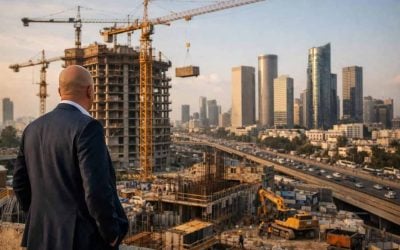Israel’s property landscape has entered 2025 on a more cautious note after several years of rapid growth. While the market remains fundamentally strong—supported by solid long-term demand and population growth—recent figures signal a shift toward lower transaction volumes, higher commercial vacancies, and greater regulatory involvement. Below is a concise overView of the latest updates and an analysis of emerging opportunities.
Residential Sector Shifts
Cooling Demand and More Renters
Recent data indicates a noteworthy drop in new mortgage activity compared to the rush seen at the end of 2024, when buyers hurried to close deals before a tax increase took effect. In January 2025, total mortgages issued fell sharply—nearly 50% less than in December 2024. Despite this, the January figure was still higher than the same period a year earlier, partly because developer-led financing schemes attracted many buyers throughout 2024.
Analysts say more Israelis are choosing to Rent rather than take on higher mortgages, given elevated interest rates and uncertain economic conditions. This preference For Renting is expected to take some pressure off home Prices and could even lead to a modest dip in asking prices in 2025. Developers who previously offered 20–40% “effective” discounts through deferred payment plans are scaling back such incentives, yet they remain open to negotiation as they adapt to more price-sensitive buyers.
Signs of a Price Correction
After years of double-digit growth, home prices are no longer surging at the same pace. Some regions are seeing minimal gains, and others have registered slight dips. Many observers predict that 2025 may become a buyer’s market in select areas, with more reasonable valuations. Economists warn, however, that any substantial drop in residential prices could have broader economic repercussions, particularly if construction slows too sharply and job creation in the building sector suffers.
Commercial Real Estate in Flux
Surging Office Vacancies
The office market faces a challenging period. New properties in traditionally sought-after business hubs are struggling to secure tenants, pushing up vacancy rates to levels rarely seen in Israel. Companies are delaying lease expansions or reLocations due to ongoing political uncertainties and the recent conflict. Even modern high-tech towers in established zones are operating at much lower occupancy levels than expected.
Tech Sector Slowdown
Israel’s high-tech industry has been a long-standing driver of office rentals, but layoffs and budget constraints have weakened demand. Firms remain cautious about committing to new office space, especially with the geopolitical climate still in flux. Landlords are offering concessions such as shorter leases and reduced rents to retain or attract tenants. Nonetheless, many in the commercial real estate sphere believe that stability in the political arena could eventually restore confidence.
Government Policies and Fiscal Changes
VAT and Municipal Tax Increases
Higher government levies have exerted more financial pressure on homeowners and developers. VAT rose from 17% to 18% on January 1, 2025, contributing to a flurry of deals at the end of 2024. On top of that, property taxes (Arnona), electricity, and water rates all increased at the start of the year, nudging inflation to around 3.3%. While these moves aim to balance fiscal needs and keep inflation in check, they also make real estate more expensive to own and maintain.
West Bank Land Purchase Bill
In a controversial move, lawmakers are advancing legislation that would allow Israeli citizens to directly purchase land in the West Bank. This would overturn a decades-old ban inherited from previous legal frameworks. Proponents argue this change expands property rights, while opponents believe it paves the way for settlement growth in volatile areas, potentially heightening international tensions. If passed, this measure would open new territory for Israeli buyers, altering the real estate map in a significant, if contentious, way.
Regional Dynamics
Divergent Price Trends
Price trends vary by region. Jerusalem and parts of northern Israel have seen slightly higher gains than Tel Aviv, though Tel Aviv remains the priciest metro area in the country. Some suburbs in the central region are experiencing small declines—an early sign of a broader correction in locations that became overheated in recent years.
Tel Aviv Land Deals
A key government land auction in Tel Aviv’s Sde Dov district revealed a 40% drop in price levels compared to peaks reached in 2022, reflecting a more cautious investor sentiment. Still, developers collectively invested over six billion shekels for multiple plots slated to deliver thousands of new housing units. This suggests that while valuations are cooler, significant capital remains in the market for high-demand locations.
Investment Outlook
High Financing Costs vs. Potential Opportunities
Mortgage rates near 5% have dampened the enthusiasm of many would-be buyers. However, for investors with cash or access to cheaper capital, the current lull could be an opportunity to negotiate favorable deals. Long-term fundamentals—population growth, limited land, and consistent foreign interest—remain supportive. Many international buyers still view Israel as a safe haven for property investments, despite geopolitical uncertainties.
Commercial Rebound Hopes
If political tensions ease and tech investment rebounds, commercial properties—particularly well-located office Buildings—may regain traction. Short-term lease structures offered today might become more profitable over the long haul, assuming market stability returns. Some institutional investors are already positioning themselves to capitalize on future demand for logistics facilities and other commercial sectors tied to infrastructure and trade.
Notable Developments and Urban Renewal
Tel Aviv Transformation
An ambitious urban renewal project in Tel Aviv’s Hahashmal neighborhood received approval, including the construction of a 30-story Mixed-use tower. This redevelopment aims to revitalize a central area with modern Apartments, Offices, and retail outlets, reflecting the municipality’s broader goal of increasing housing density and improving city infrastructure.
Infrastructure as a Growth Engine
Regional infrastructure initiatives, such as expanded transportation routes in the north and post-conflict rebuilding efforts in southern areas, could stimulate local property markets. These projects often lead to better connectivity, higher land values, and renewed interest from both domestic and foreign investors.
Looking Ahead
- Price Stabilization: With tax hikes in effect and higher mortgage rates, the pace of home sales is likely to remain moderate, leading to a more balanced residential market.
- Commercial Sector Caution: Office vacancies may persist until businesses regain confidence. A calmer geopolitical environment would accelerate the recovery.
- Policy Influence: Legislation and government programs—ranging from land tender pricing to West Bank property rules—will shape both the scope and direction of real estate growth.
- Investment Potential: While risks remain, current adjustments may present strategic buying opportunities for investors seeking assets at more realistic valuations.
Overall, Israel’s real estate market is in a period of recalibration. Rising costs, political uncertainties, and shifting buyer preferences are creating headwinds. Yet the sector’s underlying resilience—grounded in consistent demand and the country’s history of weathering crises—suggests that once the dust settles, opportunities will emerge for those prepared to navigate the evolving landscape.




